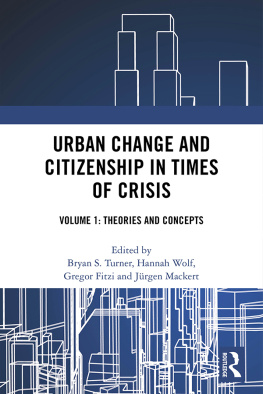ROUTLEDGE LIBRARY EDITIONS: SOCIAL THEORY
Volume 86
TALCOTT PARSONS ON ECONOMY AND SOCIETY
TALCOTT PARSONS ON ECONOMY AND SOCIETY
ROBERT J. HOLTON AND BRYAN S. TURNER
First published in 1986
This edition first published in 2015
by Routledge
2 Park Square, Milton Park, Abingdon, Oxon, OX14 4RN
and by Routledge
711 Third Avenue, New York, NY 10017
Routledge is an imprint of the Taylor & Francis Group, an informa business
1986 Robert J. Holton and Bryan S. Turner
1986 Chapter 3 Roy Fitzhenry
All rights reserved. No part of this book may be reprinted or reproduced or utilised in any form or by any electronic, mechanical, or other means, now known or hereafter invented, including photocopying and recording, or in any information storage or retrieval system, without permission in writing from the publishers.
Trademark notice: Product or corporate names may be trademarks or registered trademarks, and are used only for identification and explanation without intent to infringe.
British Library Cataloguing in Publication Data
A catalogue record for this book is available from the British Library
ISBN: 978-0-415-72731-0 (Set)
eISBN: 978-1-315-76997-4 (Set)
ISBN: 978-1-138-78698-1 (Volume 86)
eISBN: 978-1-315-76376-7 (Volume 86)
Publishers Note
The publisher has gone to great lengths to ensure the quality of this reprint but points out that some imperfections in the original copies may be apparent.
Disclaimer
The publisher has made every effort to trace copyright holders and would welcome correspondence from those they have been unable to trace.
Talcott Parsons on economy and society
Robert J. Holton
and
Bryan S. Turner
First published in 1986
by Routledge & Kegan Paul plc
Reprinted 1988 by Routledge
11 New Fetter Lane, London EC4P 4EE
29 West 35th Street, New York, NY 10001
Set in Linotype Palatino
by Input Typesetting Ltd
and printed in Great Britain
by St Edmundsbury Press Ltd
Bury St Edmunds, Suffolk
Robert J. Holton and Bryan S. Turner 1986
Chapter 3 Roy Fitzhenry 1986
No part of this book may be reproduced in any form without permission from the publisher, except for the quotation of brief passages in criticism
Library of Congress Cataloging in Publication Data
Holton, R.J.
Talcott Parsons on economy and society.
Bibliography: p.
Includes index.
1. Parsons, Talcott, 1902 Criticism and interpretation. 2. SociologyUnited States.
I. Turner, Bryan S. II. Title.
HM22.U6P3747 1986 301.0924 86629
British Library Cataloguing in Publication Data
Holton, R.J. (Robert John), 1946
Talcott Parsons on economy and society.
1. Society. Theories of Parsons, Talcott, 19021979
I. Title II. Turner, Bryan S. (Bryan Stanley), 1945
301.0924
ISBN: 0-415-03192-3
Contents
Robert J. Holton and Bryan S. Turner
Robert J. Holton
Bryan S. Turner
Roy Fitzhenry
Bryan S. Turner
Robert J. Holton and Bryan S. Turner
Nostalgia
A form of melancholia caused by prolonged absence from ones home or country.
Melancholia
A functional mental disease characterised by gloomy thoughtfullness, ill-grounded fears and general depression of mind. (Oxford English Dictionary)
This study of Talcott Parsons grew out of a series of public seminars from the Thursday workshop in sociology at the Flinders University of South Australia. We are grateful to the participants for the quality of their critical response which provided an important stimulus for this book. In particular, we wish to thank Dr Anna Yeatman who was one of the principal organizers and discussants in the sessions on Parsons. Her forceful presentation of Parsons identification of the social proved to be a major determinant of our conceptualisation of this project. Professor Bruce Kapferer also contributed a valuable paper on Parsons analysis of the social system which influenced the course of this study. We are also grateful to Dr Roy Fitzhenry who has contributed a chapter on the debate between Parsons and Alfred Schutz.
We are particularly grateful to Kevin White who read the original manuscript and warned us against over-enthusiastic commitments. Ina Cooper and Susan Manser converted handwritten manuscripts into a readable text.
Robert J. Holton and Bryan S. Turner
Introduction
It is an unfortunate feature of academic life that the death of an author is typically the occasion for a revival of his influence. Since the death of Talcott Parsons in Munich in 1979, it has become clear that a significant re-appraisal of Parsons sociology and his impact on modern sociology is well underway (Mnch, 1981; Holmwood, 1983a; 1983b; Alexander, 1984). Although few commentators would question Parsons influence, there is massive doubt as to the value of Parsonian sociology. As Richard Mnch has recently observed, while Parsons cannot be generally ignored, the conventional attitude toward his theory is one of critical aloofness (1981, p. 710). Despite the abundance of texts on Parsons sociology a comprehensive evaluation of his sociology sufficient to dissipate this stance, has yet to appear.
This volume on Parsons and the sociological paradigm may be appropriately regarded as part of this new wave of re-evaluation. At the same time, our aim is somewhat wider than to provide an exposition of Parsons sociology. One of our underlying assumptions is that to provide an adequate justification and appreciation of Parsons sociology is simultaneously to offer a defence of sociology itself. The importance of Parsons work is that it attempted to outline in an unambiguous manner a map of the social. This comprised both the defining of boundaries between society and organic life, and the internal exploration of social relations between culture, personality, and social structure. Parsons sociology can thus be seen as a quest for the sociological paradigm.
This study is not then yet another textual exegesis of Parsonss major works; it is not even an attempt to develop a uniform interpretation of the corpus of Parsons sociology. There already exists a number of useful interpretations of Parsons (Black, 1971; Rocher, 1974; Adriaansens, 1980; Bourricaud, 1981; Savage, 1981; Hamilton, 1983). Interpretation and re-interpretation clearly have a place in the development of sociological theory, but they are not the overriding exercise or endeavour. As Alexander (1984) has recently implied in his important assessment of Parsons, the aim of theorising is ultimately with matters of application, extension, elaboration and comparison. The present study is offered in this spirit. The chapter on Parsons economic sociology ().
While this analysis of Parsons has sought to avoid a repetitious exegesis of key texts, it does not attempt to redress the present lack of an intellectual biography of his development. There have been attempts to locate Parsons sociology in the context of American capitalism and intellectual life, but such studies so far lack authority because they are too general and unbalanced to command respect (Gouldner, 1971; Mills, 1959). An intellectual history of Parsons of the stature of Reinhard Bendixs classic work on Max Weber (Bendix, 1969) or Steven Lukes study of Emile Durkheim (Lukes, 1973), has not as yet been forthcoming, although Jeffrey Alexanders recent work (1984) offers many pertinent comments in this area. Parsons himself has of course offered a useful autobiographical essay On building social system theory; a personal history in






